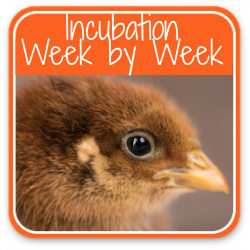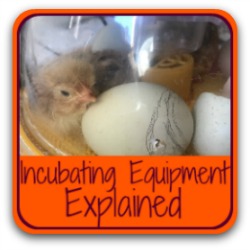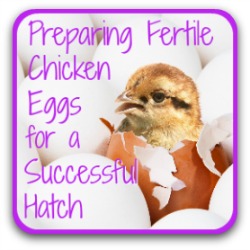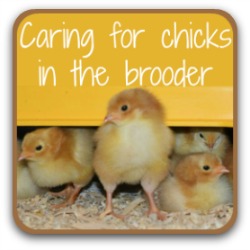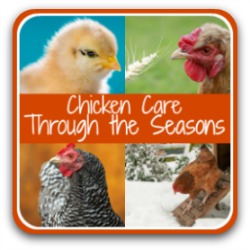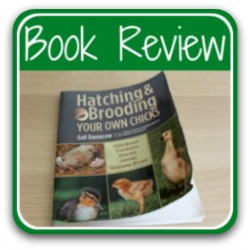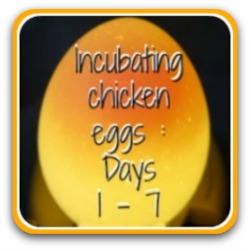- Home
- Before you incubate
- Are you ready?
How to prepare for incubating and raising baby chicks: five things to consider.
So you want to hatch or buy chicks? It can be an amazing experience. But if you don't plan ahead, it can turn into your worst nightmare.
The five questions I'm about to ask will help you be absolutely sure it's the right thing for you and for your family.
Why the need to plan?
Because as the saying goes (almost): "With great chickens comes great responsibility". And with baby chicks you can multiply that by at least ten.
It may be that you think you've thought about this all you need to. I still want you to read on. It could save you a lot of heartache in the future.
Everyone loves a baby chick in the same way that everyone loves a cuddly kitten or puppy.
They're cute. They small. They're fluffy. They have a definite "awwwww" factor.
And then, they grow up.
They become large, noisy, hungry, very efficient poop machines who need looking after. And they reach that stage incredibly quickly.
It may be that you've thought about keeping poultry for years. You've considered everything, you know what the legal implications are and you've asked yourself all the right questions about how a flock will fit in with your family.
That's great too. But I still want you to read on.
Everyone loves a baby chick!
Let me introduce you to Sassy. She's one of my Light Sussex chicks, hatched in the Brinsea Mini Advance incubator. She's just two days old in this photo.
 One of my Light Sussex chicks at 2 days old - what's not to love?
One of my Light Sussex chicks at 2 days old - what's not to love?And here she is just four weeks later. "She" was clearly going to be a "he". No crowing yet, but look at the size of that comb...
 The same baby just 5 weeks later, losing down and growing feathers - and a comb!
The same baby just 5 weeks later, losing down and growing feathers - and a comb!So here's question 1: what will you do with chicks who turn out to be male?
This is the most critical question of all. Do you want to have roosters in your flock?
Because if you buy "straight run" chicks, you won't be able to tell male from female. and even some reputable hatcheries will mix in males with females.
If you incubate your own, you may be lucky and hatch nothing but hens. Wonderful!
But in all the time I've been incubating and hatching, that has never happened to me. Ever. At best, I've had 70% hens and 30% roosters. Once, I hatched a clutch of 6 chicks, of which 4 were male.
- With many breeds, you cannot tell whether eggs are going to turn out male or female. If you incubate and hatch sex-linked breeds like the Speckled Sussex, you will be able to tell which is which - but not until after they've hatched. Then what?
See that cute fluffy chick in the pic above? I called "her" Sassy, because "she" was. And then, one morning, she began to make the strange, strangled sound that can only come from a rooster developing his crow...
This is Sassy. That cute, fluffy little chick grew up to be a handsome, noisy rooster.

And then there's the time when the hormones kick in.
- How do you feel about your hens being constantly damaged by an over-zealous male?
- And how would you react when your amazing-looking rooster decides he needs to guard his flock - which he's genetically programmed to do - by attacking you every time you go into the run?
Because, trust me on this, it hurts. A lot.
Those spurs are sharp, and strong. It can make collecting eggs and spending time with your hens a much less pleasant experience. Not every rooster becomes a guard-chicken, but most do. That's their job. They're not "bad" or "aggressive" - they're protectors, doing what they're supposed to do.
This is one of the most serious issues with buying or hatching your own chicks. Before you start, be very, very sure that you can either keep them or find homes for males.
Culling males because you haven't thought things through properly is not acceptable.
If you don't have an answer to this please - don't even think about incubating, or buying "straight run" chicks!
Question 2: are you prepared for brooding your chicks?
Those tiny balls of fluff soon grow. Within a few days they have started to grow wing feathers and within a week, they'll be experimenting with flying. They don't fly far, or for long but they will, eventually, fly out of your brooder.
If you have several chicks at once you'll discover that within three weeks (at most) they will have outgrown the first stage brooder which you thought would last them for at least a couple of months.
At that point, you'll need to invest in something like a puppy pen as an expandable brooder box.
And they can't safely go outside until they're a minimum of eight weeks old. Depending on breed and weather, it can be closer to eleven weeks.
They need to be too large for birds of prey (or even crows) to take, large enough to withstand bullying from the rest of your flock, and they need to have enough feathers to keep them warm without a heat source.
Moving outside in summer months can be an issue if there's extreme heat. Chicks have more trouble than adults controlling their temperature.
Watch my short video for the reality of what it's like to have a chicken brooder in the house.
It's a shame video can't communicate smell because, trust me, the smell in my bathroom was not pleasant. So watch the video, listen to my words and decide whether you could put up with this in your house!
Chicks can quickly die of cold, too. So unless you have somewhere warm for them to live you'll have a problem on your hands.
Where will you keep them until then? Have you got somewhere outside which you can keep warm? Or will you have to keep them in your house? And if so, do you really mind your lovely house smelling of chicken poop?
Because trust me, as chicks start to grow, they smell. A lot.
Does it worry you if the bathroom you thought would be a nice, warm place for your chick-babies becomes a place you don't want to look at?
Look at that video. My bathroom was a scene of devastation - and as I pointed out, I cleaned this place. Every. Single. Day.
Could you deal with that? OK - then let's move on!
Question 3: preparing for incubating or buying chicks – do you have the time and money?
My next question is relevant before we even look at the process of incubating or buying chicks. It is:
"Are you absolutely sure you have the time, patience, energy and money for chickens?"
Not the tiny little fluffies who hatch from your eggs, but the adults who will depend on you for their food, water, health and a safe place to live for several years?
I don't want to put you off. I just want you to be sure. I love chicks - hatching is one of the most fascinating and satisfying experiences you can have, and if you have children or grandchildren it's a wonderful experience for them too.
But...
What about money?
Incubating can be costly – and so can eggs!

Leaving the eggs or chicks themselves aside for a moment, there's all the things you have to buy for a successful incubation and for life after hatching, in the brooder.
Think about it.
- If you're going to incubate, there's the cost of the incubators and candlers.
- For chicks, you'll need waterers, feeders and feed for chicks. Not forgetting feed for the chicks when they're adults.
- There's the grit and oyster shell...
- And everyone wants to give their baby (and adult) chickens treats...
- Then there's the brooder, bedding, the heat lamp for when the chicks are inside, not to mention the coop for when they're old enough.
- Add to that the potential veterinarian bills and you have a drain on your money which you'd have to have a lot of eggs to make up for.
So a word of warning: if you are thinking of having chickens to give you free food, think again.
Home-laid eggs are wonderful - and far healthier for you than the mass-produced factory farmed ones.
But they do not come free!
Leaving the eggs or chicks themselves aside for a moment, there's all the things you have to buy for a successful incubation and for life after hatching, in the brooder.
Think about it.
- If you're going to incubate, there's the cost of the incubators and candlers.
- For chicks, you'll need waterers, feeders and feed for chicks. Not forgetting feed for the chicks when they're adults.
- There's the grit and oyster shell...
- And everyone wants to give their baby (and adult) chickens treats...
- Then there's the brooder, bedding, the heat lamp for when the chicks are inside, not to mention the coop for when they're old enough.
- Add to that the potential veterinarian bills and you have a drain on your money which you'd have to have a lot of eggs to make up for.
So a word of warning: if you are thinking of having chickens to give you free food, think again.
Home-laid eggs are wonderful - and far healthier for you than the mass-produced factory farmed ones.
But they do not come free!
Question 4: Are you prepared for when incubating goes wrong? What about your children or grandchildren or students?
Incubating and hatching chicks is the most wonderful experience. Mostly. But it can be heartbreaking.
Successful hatches don't automatically happen, even if you do everything right. Sometimes eggs just aren't fertile. Sometimes they're fertile and start to develop but die very quickly afterwards, for reasons which aren't always understandable.
Are you ready, when candling an incubated egg, to find a blood ring? How will you explain it to your children?
Sometimes a chick hatches but has severe physical
problems. Are you willing to cull a chick if her problems are just too overwhelming for her to have a good quality of life?
And sometimes a chick can die at the very point of
hatch, or soon afterwards. Hatching is a complex process and a newly hatched chick is fragile. A lot can go
wrong, even if you're experienced.
Are you ready for that? Are your kids?
Question 5: What about problem chicks?
There are those who hatch successfully but are too weak to stand, or who arrive with a spraddled leg, or wry neck, a crossed beak, or develop "pasty butt".

Are you organised enough to have a first aid kit ready? And somewhere to isolate and house a sick chicken? Both of which add to the cost, of course...
And how do you feel about having to try to correct those things? Are you squeamish about cleaning off a chick's poop? Have you researched how to deal with problems?
Most importantly, ask yourself whether you could you deal with your childrens' tears if it all, or even a part of it, goes wrong.
The decision is yours!
Once you've thought about these five questions, answered them honestly and still want chicks, that's great: let's prepare to incubate.
But if there's any single part of it you're unsure about, my advice would be – wait.
Think about it some more. Talk to your family. Ask what they think. And then, think some more. Take my quiz to see whether your family is really ready to keep chickens.
I know you might feel frustrated with all this thinking - but trust me with this - it's absolutely critical.
Whatever your final
decision is, you'll thank me for it one day!

Want to incubate?
If you're not used to incubating, or you have done it before but you could still use some more information, this short series could be just right for you.
I take you through the process of incubation from start to hatch using expert information, pictures, diagrams and videos - one day at a time.
To learn more, click on the pic.
If you found this page helpful, you may also be interested in these.
- Home
- Before you incubate
- Are you ready?

